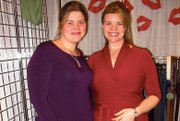Made in Mauritius Is Denim Designer's New Tag Line
In Los Angeles’ manufacturing community, denim is king. But as price sensitivity for premium denim grows among consumers, some companies are looking for alternatives.
One of those is Orange County, Calif.–based Svoboda, which recently moved production from California to southern Africa in Mauritius, a small island in the Indian Ocean, east of Madagascar.
Svoboda was among the first companies to bring premium denim to the plussize market, but that segment was not used to paying the prices affiliated with designer jeans. The company was using some of the best wash houses in Los Angeles to finish its garments, and the prices reflected that, with jeans hitting $165 a pair. But as sticker shock began rising over the past year among consumers, the designer began searching offshore to help her adjust the cost structure of her growing line.
Svoboda’s owner and designer, Jessica Svoboda, found a source in Las Vegas, at the Sourcing at MAGIC show. She had choices in Mexico, Central America and Asia, of course, but settled on Mauritius because it’s a gateway to the European market, which Svoboda has been seeking out. Mauritius is part of the African Growth Opportunities Act (AGOA), which provides duty-free and quota-free treatment for eligible apparel articles made in qualifying sub-Saharan African countries through 2015.
President Bush has signed a number of amendments, which have enhanced AGOA and lured more U.S.-based clients such as Wal-Mart stores. The trade pact is intended to help underserved African factories better compete with Asia and other better-equipped manufacturers.
The factory Svoboda partnered with also specializes in high-end denim for the European market and can accommodate production capacities of up to 75,000 units per day.
“It’s family-run. We checked them out. We’ve been there. They pay market wages and have extensive capabilities,” she said.
The company can do a variety of washes and hand embellishments that Svoboda sometimes uses to bling up her jeans. The restructuring has helped bring wholesale prices down substantially, from $75 to $65 and $54 to $48. Retail prices dropped to $128 from $165.
Svoboda is sold at Nordstrom, Saks Fifth Avenue, Neiman Marcus and a host of specialty stores as well as on the company’s e-commerce site (www.svobodastyle.com). Aside from denim, Svoboda sells knit tops, dresses and leather items.
Adjusting to offshore sourcing has required patience and diligence, said Svoboda.
“Here you can do things in 30 days, but now we have to get all our fabric buys and everything done four months ahead.”
So far, the restructuring has been worth the effort, she said. In its brief three-year history, the company has made inroads, not only in the plus market but in more mainstream channels. Svoboda recently expanded sizing from sizes 10 to 28. She previously started at size 12. The company just launched a “brand ambassador” program for college students and has landed a distribution deal in Australia.
Svoboda expects to start advertising in the third quarter and may for the first time take on investors, she said. Company sales are forecast to grow three- to sixfold this year, she said.
Despite where she makes her product, Svoboda said the primary drivers of sales have been fashion, fit and philosophy. Since day one, the company has done a lot of work at the grass-roots level, educating stores and consumers about her line and of the stigmas attached to the plus market.
“A lot of people look only to the extreme end of the plus-size market, but it’s really about normal women— the person standing in front of you at Starbucks. We are trying to change perspectives and change lives,” she said. —Robert McAllister






















